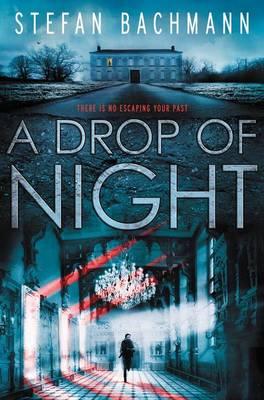Unfortunately, A Drop of Night was not quite what I was expecting. The book cover and initial set-up of the book led me to believe this would be a story where the characters use cool specific skill sets to get themselves out of the palace. After all, the book jacket has a catchy questionnaire protagonist Anouk supposedly answered to be selected for this expedition, and the inside jacket has the acceptance letter sent to those chosen for the job. I guess I was expecting something like a dark, YA Mysterious Benedict Society, but it turns out the specific skills the teens have are irrelevant. Any characters could have been dropped into the palace and had basically the same chances of "solving" their way out.
I also wasn't quite on board with the flirtation with fantasy the book has. I imagine the author would want to argue it's really science fiction or speculative fiction, but a lot of the plot bordered on the unrealistic for me, which isn't necessarily what I want from a thriller. I want to believe that something like this could happen, and I didn't. A lot of Goodreads reviewers emphasize the "horror" aspect of the book, but I wasn't scared at all (and, believe me, I am afraid of EVERYTHING). I could read this in the middle of the night alone in a cemetery and not be disturbed because so much of the plot is absurd. (A lot of it was also confusing and contradictory, but I won't go into details so I can avoid giving too many spoilers.)
As a foil to the main action, there are chapters interspersed from 1789, when the underground palace was first being built. These are first person POV in Aurelie's voice, daughter of the duke who designed the palace. While Aurelie is spunky and warmhearted, and I think many readers will like her, the writing of these chapters is awkward. Bachmann belongs to the school of writers who think historical dialogue is to be written in painfully formal, nearly contraction-less terms. I thought Aurelie sounded more like a little girl playing dress up and awkwardly trying to use big words to be taken seriously by the surrounding grown-ups, and not like someone who's speech was organic. In the following quote she particularly strikes me as someone overly compensating with formality in an attempt to be treated like an adult:
"Father...Good health to you. It is wonderful to see you again. I"m sure you have been very busy, but I must confess I have found the explanations for my imprisonment, for my separation from my sisters and our complete isolation, to be rather slow i revealing themselves....Father...You will speak to me, please. I am you daughter. I am kept here as a prisoner, without human company, without a word of justification. Our mother is dead, my sisters are alone, and we cannot mourn her,. or comfort each other."
Bachmann tries to do a better job with the modern-day characters. They even have have a legitimate icebreaker where they all tell each other about their lives, but I personally wasn't invested in any of them. Protagonist Anouk is kind of aggressive and unpersonable, which isn't a problem by itself; it's possible to enjoy an "unlikable" character, but I wanted to like at least one person, and I didn't. The boys often felt interchangeable to me, and I often last track of which was which.
The premise of A Drop of Night is interesting in theory, but the plot gets messy fast. Coupled with the fact I wasn't invested in the characters, didn't think the "game" to get out of the palace was as clever as it could have been, and generally thought the plot was convoluted, I don't think I can recommend the book.
*As a side note, I just realized Bachmann wrote The Peculiar, when I DNFed a few pages in because I didn't like the writing. I suppose he's simply not the author for me.
